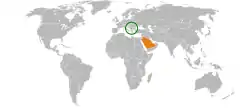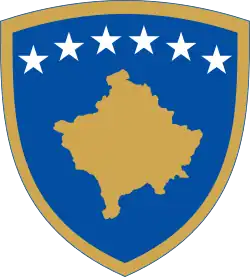Kosovo–Saudi Arabia relations
Kosovo–Saudi Arabia relations are foreign relations between the Kosovo and Saudi Arabia. Like Saudi Arabia, Kosovo has a mainly Muslim population.
 | |
Kosovo |
Saudi Arabia |
|---|---|
| Diplomatic mission | |
| Embassy of Kosovo, Riyadh | none |
| Envoy | |
| Ambassador Lulzim Mjeku | none |
History
Socialist Autonomous Province of Kosovo was an autonomous province of the Republic of Serbia during the Socialist Federal Republic of Yugoslavia (1946–92), and then of Serbia during the Federal Republic of Yugoslavia. During the Kosovo War (1998–99), the Kosovo Liberation Army (KLA) received foreign mercenaries from, among others, Saudi Arabia.[1] During UN administration, Saudi Arabian organizations sought to establish a cultural foothold in Kosovo.[2]
Kosovo declared its independence from Serbia on 17 February 2008 and Saudi Arabia recognised it on 20 April 2009.[3][4] Saudi Arabia has a Liaison Office in Pristina[5] and Kosovo planned to open an embassy in Riyadh later.[6] On 22 December 2009, Saudi ambassador Abdullah Abdulaziz (who is also ambassador to Albania and to the Republic of North Macedonia) presented his credentials to Kosovar President Fatmir Sejdiu.[7]
On 25 May 2009, at the Organisation of the Islamic Conference's 36th session of the Council of Foreign Ministers in Damascus, the 57 member states adopted a resolution that noted Kosovo's declaration of independence, upheld the role of the United Nations in Kosovo, reaffirmed the strong interest of the OIC regarding Muslims in the Balkans, welcomed the co-operation of Kosovo with the OIC Economic and Financial institutions, and called on the international community to continue contributing to the fostering of Kosovo's economy.[8] Saudi Arabia was one of the main Islamic states backing this resolution and it has been reported that an earlier draft of the resolution (tabled by Saudi Arabia) had called for recognition of Kosovo by Islamic countries, but this was rejected by some member states, including Syria, Egypt and Azerbaijan.[9]
Saudi Arabia spoke in support of Kosovo at the International Court of Justice's oral debate on the legality of Kosovo's independence in 2009.[10]
Islamic extremism
Like Saudi Arabia, Kosovo has a mainly Muslim population.[11] The traditional Islam in Kosovo is the Hanafi school, described as 'liberal' and 'moderate'.[11]
See also
References
- John Pike (May 1999). "Kosovo Liberation Army [KLA]". Globalsecurity.org.
- Lyubov Grigorova Mincheva; Ted Robert Gurr (3 January 2013). Crime-Terror Alliances and the State: Ethnonationalist and Islamist Challenges to Regional Security. Routledge. pp. 34–. ISBN 978-1-135-13210-1.
- "Saudi Arabia recognizes Kosovo". New Kosova Report. 2009-04-20. Archived from the original on 2009-04-22. Retrieved 2009-04-20.
- "Saudi Arabia announces recognition of the Republic of Kosovo". Saudi Press Agency. 2009-04-20. Retrieved 2009-04-20.
- Foreign representations – Directory in Pristina
- "Kosovo plans Riyadh embassy" arabnews.com 23 April 2009 Link accessed 23 April 2009
- "Saudi Arabia to encourage other Muslim countries to recognise Kosovo – ambassador" 22-12-09 Link received 23-12-09
- "Resolution no. 14/36-POL on the Situation in Kosovo" (PDF). Resolutions on Political Affairs adopted by the 36th session of the Council of Foreign Ministers. Organisation of the Islamic Conference. 2009-05-25. Archived from the original (PDF) on 2015-11-23. Retrieved 2009-05-25.
- "Saudi Kosovo proposal fails at OIC". B92. 2009-05-24. Archived from the original on 2009-09-04. Retrieved 2009-05-25.
- "ICJ Sets Agenda for Kosovo Hearing " balkaninsight.com 08-10-09 Link retrieved 09-10-09
- Testa 2016.
Sources
- Testa, Andrew (2016-05-21). "How Kosovo Was Turned Into Fertile Ground for ISIS". New York Times. Retrieved 2016-05-01.

